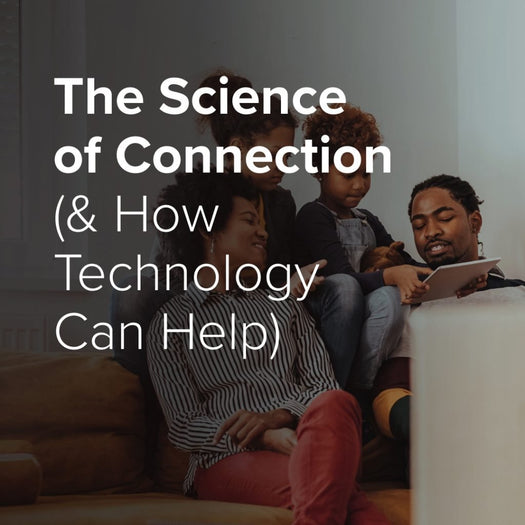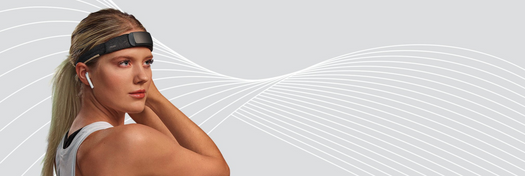The Science of Connection (& How Technology Can Help)

From missing seeing the ones we love in-person to feeling more lonely living alone, the pandemic has highlighted a fundamental human need: connection. It’s brought our lives online and in lieu of face-to-face, we’re doing work, meeting newborns, and attending weddings virtually. And while occasional feelings of disconnect and loneliness can be normal, prolonged periods of it can not only hurt but have a negative effect on our mental and physical health. What’s the reason we feel this way? It’s how we’re wired.
Why We’re Hard-Wired for Human Connection
Why is loneliness so painful? Why do we care what others think so much or overthink things when it comes to relationships?
Listen to the Relationships Collection >
Because we’re social creatures. We evolved to be this way out of necessity. Back when we roamed the plains, we had a much better chance of survival if we had other animal friends we could depend on. And while we don’t have these same threats today, we’ve kept our social nature and continue to have a deep need to be with others (1).

In fact, research has found that our need for connection may be as fundamental as our need for food and water. In his book, Social, scientist Matthew Lieberman highlights that many languages around the world use the same words for social pain as for physical hurt. For example, “he broke my heart” or “they hurt my feelings.” And Lieberman says what this means is significant (3):
“The things that cause us to feel pain are things that are evolutionarily recognized as threats to our survival and the existence of social pain is a sign that evolution has treated social connection like a necessity, not a luxury.”
He goes on to explain what this means for how we’re motivated:
“It also alters our motivational landscape. We tend to assume that people’s behavior is narrowly self-interested, focused on getting more material benefits for themselves and avoiding physical threats and the exertion of effort. But because of how social pain and pleasure are wired into our operating system, these are motivational ends in and of themselves. We don’t focus on being connected solely in order to extract money and other resources from people—being connected needs no ulterior motive (3).”

Many studies over the decades have come to similar conclusions as Lieberman. Dr. Emma Seppala, of the Stanford Center for Compassion and Altruism Research, found that “social connectedness generates a positive feedback loop of social, emotional, and physical well-being.” Seppala also found that people who feel more connected show lower levels of anxious and depressive feelings, greater empathy for others, and also tend to be more cooperative and trusting (4).
Similarly, a lack of social connection can have a host of negative effects. One study of 7,000 men and women of different ages, gender, and health states in Alameda County, CA found that “people who were disconnected from others were roughly three times more likely to die during the nine-year study than people with strong social ties (4).”

What else did they find? Regardless of demographic, those with unhealthy lifestyles but close social ties lived longer than those with healthy living habits but poor social connection. And yes, those that were social and made healthy choices lived the longest (4). Not only are relationships fundamental to our health and happiness, but research shows they may even shape how we use our brain to make decisions (5).
Your Brain on Connection
What might be even more fascinating in the world of connection research, is getting to peer into our brain and the effect relationships have on it. According to Lieberman’s research, there are three different neural networks in our brain that promote social connection. They allow us to feel social pain and pleasure, read others’ emotions and predict their behavior, as well as take up cultural beliefs and values that can help connect us to our social groups (2).
Because social pain is experienced through the same neural pathways that process physical pain, researchers have found that Tylenol is not only helpful for your migraine but can also help minimize the pain of a broken heart (2). Studies have also found that the pain centers in our brain light up when we’re treated unfairly, while our reward centers are triggered when fairness reigns (2).

Lieberman and his colleagues also examined how connection affects our learning. In one study, subjects were asked to lie in an fMRI scanner while they watched pilot ideas for a new TV show. After, they were asked to describe the ideas to a TV producer. When subjects found a show that piqued the producer’s interest, the mind-reading network in the brain lit up. What this suggests is that when we’re learning, we’re not just interested in absorbing facts. We’re also thinking about “who we can share it with and how we can share in a compelling way (2).”
How Technology Can Help Us Feel More Human Connection
For the times when we can’t see people in person (as well as when we can), studies show that technology is also an effective tool to maintain connection. You’re probably familiar with video-call platforms like Zoom, Skype, and FaceTime that can help you connect face-to-face. Here are a few other science-backed ways that technology can help us feel more connected to ourselves and others.
Alone vs. Lonely: What’s the Difference?>
Social Media Activities That Promote Happiness
Social media is the digital hangout hub. And while we know overuse of it has its downsides, it’s still a place where we can engage socially as well as be helpful, supportive, and kind to our community—activities that have been shown to boost health and well-being (6).

One study found that social media could help with symptoms of depression (6). It looked at social media use among young people and found that it was a key place where they could “express themselves creatively, get inspiration from others, and even feel less lonely.” In fact, 30% of those in the study said that when they’re feeling depressed, stressed, or anxious, social media often makes them feel better. Only 22% said it made them feel worse (6).
Engaging With Your Community
Using social media passively—just scrolling without interacting with others—apparently can make you feel more depressed, according to one study. The reason? Being passive can bring about “upward social comparison behaviors,” and arouse feelings of envy and inferiority (7).

On the other hand, the study found that active social media users—those who post as well as like and comment—tend to have lower levels of depression (7). They said that over time, being active brought more likes and social support right back to them, which helped lower their depressive feelings. The key is focusing on using these platforms for social connection instead of social comparison.
Learning New Mindful Habits And Goals
With endless apps and platforms, technology has given us what feels like unlimited access to health and wellness resources. It’s never been easier to practice skills like gratitude, mindfulness, and meditation online. There’s an app available for everything from mood tracking to sleep support, fasting to learning therapeutic breathing. And research suggests that apps like Muse, can, in fact, teach us the skills we need to help optimize our mental health and well-being (5). Learn how to communicate your truth, connect to your loved ones, and find gratitude in any moment by listening to the Relationships Collection in the Muse app below.
Despite all of the current challenges to connection, technology can go a long way toward helping us meet our social needs. And you might take comfort in knowing that feelings of loneliness and disconnection are not only common but are a result of how we’re wired. So whether you’re chatting online or joining a Zoom room, remember that remote connection counts and might help you value the in-person time even more.
References:
- Sreenivasan, Shoba, Ph.D and Weinberger, Linda E., Ph.D. 2016, December 14. Why We Need Each Other. (Blog post). Psychology Today. https://www.psychologytoday.com/us/blog/emotional-nourishment/201612/why-we-need-each-other
- Suttie, Jill. 2013, December 2. Why Are We So Wired to Connect? (Blog post). Greater Good Science Center. https://greatergood.berkeley.edu/article/item/why_are_we_so_wired_to_connect
- Cook, Garreth. 2013, October 22. Why We are Wired To Connect. (Blog post). Scientific American. https://www.scientificamerican.com/article/why-we-are-wired-to-connect/
- Brody, Jane E. 2017, June 12. Social Interaction Is Critical for Mental and Physical Health. The New York Times. https://www.nytimes.com/2017/06/12/well/live/having-friends-is-good-for-you.html
- Platt, Michael, Ph.D. 2018, July 19. Wired to Connect. (Blog post). Psychology Today. https://www.psychologytoday.com/us/blog/fine-tuning-human-performance/201807/wired-connect
- Rideout, Victoria, M.A. and Fox, Susannah. 2018, Summer. Digital Health Practices, Social Media Use, and Mental Well-Being Among Teens and Young Adults in the U.S. Hopelab. https://hopelab.org/reports/pdf/a-national-survey-by-hopelab-and-well-being-trust-2018.pdf
- Frison, Eline and Eggermont, Steven. 2015, December 3. Toward an Integrated and Differential Approach to the Relationships Between Loneliness, Different Types of Facebook Use, and Adolescents’ Depressed Mood. Sage Journals. https://journals.sagepub.com/doi/full/10.1177/0093650215617506
- Huguet, Anna; Rao, Sanjay; McGrath, Patrick J.; Wozney, Lori; Wheaton, Mike; Conrad, Jill; Rozario, Sharlene. 2016, May 2. A Systematic Review of Cognitive Behavioral Therapy and Behavioral Activation Apps for Depression. Plos Journals. https://journals.plos.org/plosone/article?id=10.1371/journal.pone.0154248
- Umberson, Debra; Montez, Jennifer Karas. 2011, August 4. Social Relationships and Health: A Flashpoint for Health Policy. Journal of Health and Social Behavior. https://www.ncbi.nlm.nih.gov/pmc/articles/PMC3150158/
- Davis, Tchiki. 2019, November 1. Four Ways Technology Can Make You Happier. (Blog post). Greater Good Science Center. https://greatergood.berkeley.edu/article/item/four_ways_technology_can_make_you_happier

